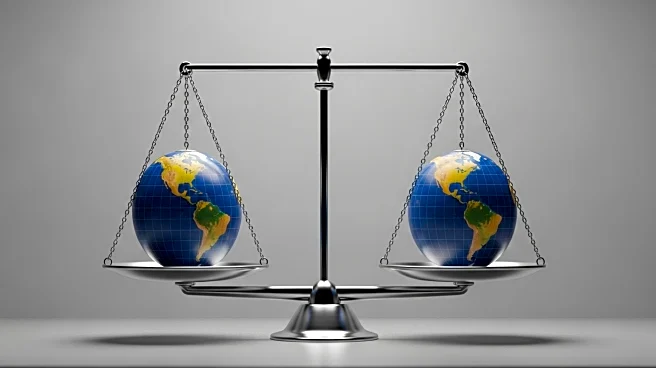What is the story about?
What's Happening?
President Donald Trump has threatened to impose a 100% tariff on Chinese imports starting November 1, escalating trade tensions between the US and China. This move comes in response to China's new export controls on rare earth elements, which are crucial for high-tech products and military applications. The Chinese government has restricted access to these minerals, requiring foreign companies to obtain special approval for exports. Trump's tariff threat follows previous negotiations aimed at reducing tariffs, but tensions remain high as China continues to limit America's access to rare earths. The S&P 500 experienced a significant drop due to concerns over the potential impact of these tariffs on global trade.
Why It's Important?
The proposed tariffs could have far-reaching consequences for the US economy and global trade relations. A 100% tariff on Chinese imports would likely increase costs for American consumers and businesses, potentially leading to higher inflation and economic instability. The restrictions on rare earth elements could hinder the development of the US industrial base and affect sectors reliant on these materials, such as electronics and defense. The escalating trade tensions may also impact diplomatic relations between the US and China, complicating efforts to resolve ongoing disputes. As both countries reach for economic weapons, the risk of a prolonged trade war looms, with potential repercussions for global economic growth.
What's Next?
The situation remains fluid, with potential for de-escalation if both sides engage in further negotiations. President Trump has not formally canceled his meeting with Chinese leader Xi Jinping, leaving room for diplomatic discussions. Analysts suggest there is time to ratchet down the tariff threat, but the outcome will depend on the actions taken by both governments. The US may consider implementing its own export controls on critical software, further complicating trade dynamics. Stakeholders will need to monitor developments closely, as the decisions made in the coming weeks could shape the future of US-China trade relations and impact global markets.
Beyond the Headlines
The trade tensions between the US and China highlight the strategic importance of rare earth elements and the leverage they provide in negotiations. As countries seek to secure these critical resources, the geopolitical landscape becomes increasingly complex. The situation underscores the need for diversified supply chains and investment in alternative sources of rare earths. The potential for a renewed trade war raises ethical and economic questions about the use of tariffs as a negotiating tool and the broader implications for international cooperation and economic stability.















